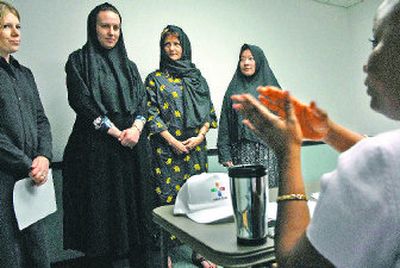Class offers little refuge

Over the years, Spokane has become home to thousands of refugees from some of the most politically repressive nations on earth. Few native-born Americans have any idea what they had to endure to get here.
On Tuesday, about 20 English language development employees of Spokane Public Schools got a taste of what as many as 12 million displaced people experience every day in refugee camps throughout the world.
World Relief, the humanitarian arm of the National Association of Evangelicals, conducted a simulation in which the school district employees were divided into groups and assumed the identities of four ethnic families: evangelical Ukrainian, Afghani Khan, Meskhetian Turk and Mareehan Somali.
Their single objective was to gain refugee status in the United States. In real life, this is no small task. For the last two years, the government has set a ceiling of 70,000 refugee placements, of which only about 41,000 obtained U.S. residency.
“Refugees are the most scrutinized people that come to the United States,” said Linda Unseth, Northwest regional director for World Relief.
The simulation was designed by Rachel Martin, a World Relief intern who graduated this year from Whitworth College in international studies. Martin had the “families” visit four sites scattered around the 1500 block of North Washington Street, where World Relief has its offices. These stations represented a food distribution center, a medical clinic, the United Nations High Commissioner for Refugees and the U.S. State Department.
The four families had 30 minutes to don traditional attire and study their ethnic identities before beginning the exercise. The Somali family was played by four school district employees: Choua Birge assumed the role of Amina Ali, 26, the only member of her family to speak English. Yelena Paprotskaya was Zi Zum, Amina’s 14-year-old sister. Amy Berube played their brother, Mohammed, 16. And Renee Rodriguez played their 40-year-old mother, Asha.
Their first stop was the food distribution center where “U.N. workers” barked orders at them in a pretend language they could not understand and offered them a bland lentil gruel to eat. The Muslim family lost points at that station by eating during daylight hours in Ramadan and for not asking whether their food contained pork.
At an actual Sudanese refugee camp, the family would have had to subsist for two weeks on 5 kilos of maize, 1 cup of lentils and 1 cup of flour.
Next stop was the clinic, where Asha had to choose whether to be treated for measles and have her children vaccinated at a cost of six credits on her ration card. She chose wisely to do so.
Had she not, she could have died and her family would not be allowed to emigrate.
At the U.N. station, the family members were subjected to an interrogation by Unseth in the role of a refugee official who would determine whether they qualified for refugee status.
It was determined that Asha’s husband, the leader of a mosque, was killed by a rival clan that had come to power in Mogadishu in 1991.
Asha was raped and the mosque burned. The family escaped to Ethiopia, where they lived for nine months before settling in a refugee camp.
All this information would later be scrutinized by non-governmental organizations. If verified, the family would be referred to the U.S. State Department or some other country’s foreign ministry.
At the State Department station the Ali family received its most severe grilling by Claudia Sawyer, a World Relief employment specialist in the role of a U.S. functionary.
Sawyer, 27, knows firsthand how refugees are treated at this station, having undergone it in real life after fleeing her native Liberia and spending 15 years in refugee camps.
She was denied entry seven times by several countries, including the United States, United Kingdom, Australia and Denmark, before she was accepted by the United States in 2005.
She arrived at Spokane International Airport and stepped into a harsh February wind.
“Culture shock is like being a baby,” Sawyer said. “You need someone to hold you by the hand and lead you.”
Since 1992, World Relief has helped 5,268 refugees settle in Spokane, and this summer the agency is planning to receive 105 more from Burma, Sudan and Burundi, among other nations.
At the end of the simulation, only the Ukrainian family was accepted for refugee status in the United States.
Among the reasons Asha’s family was denied: when asked why she wanted to emigrate to the U.S. she answered truthfully that she needed a job.
Refugee status isn’t granted based on economic need.